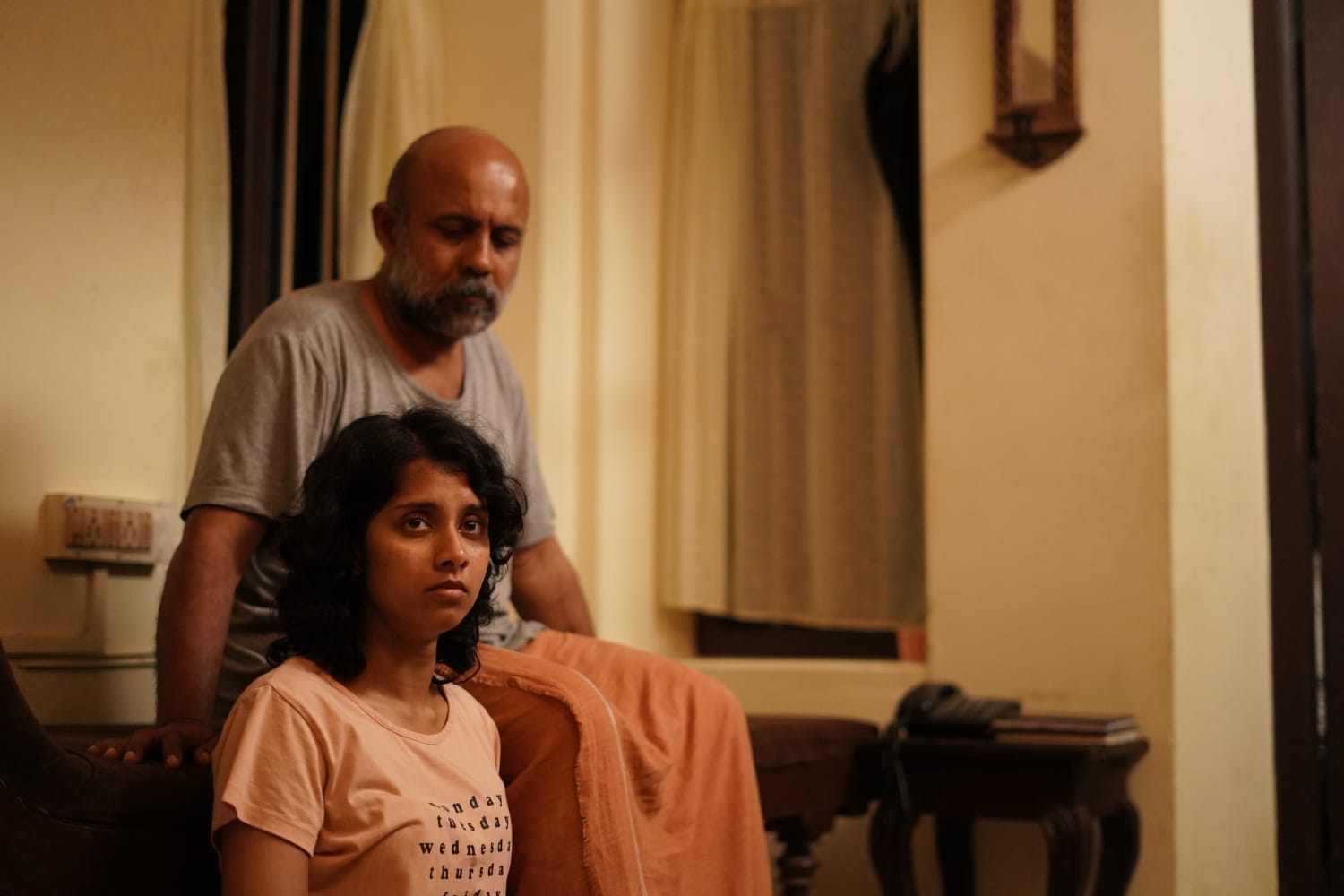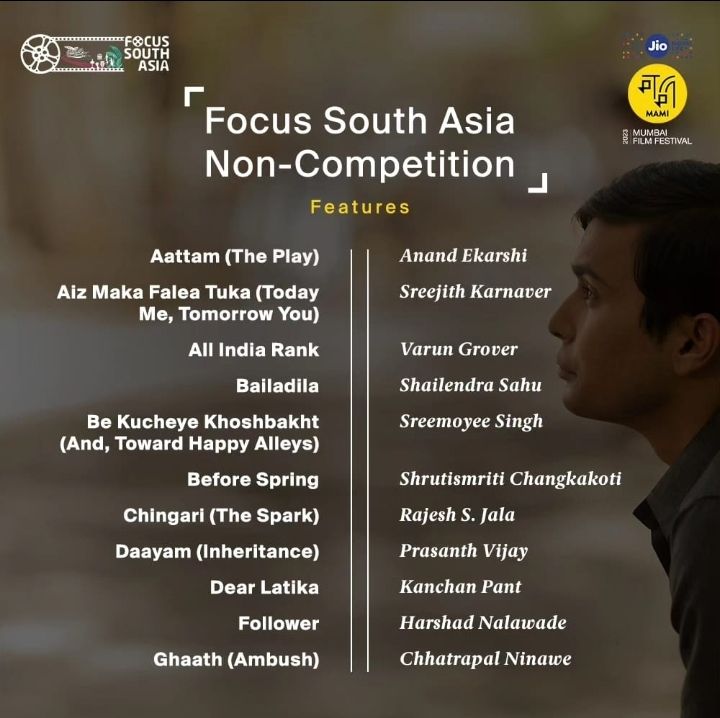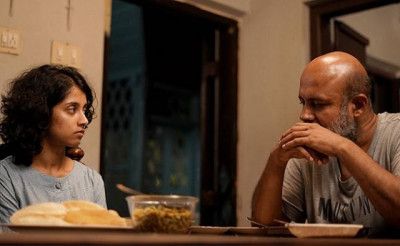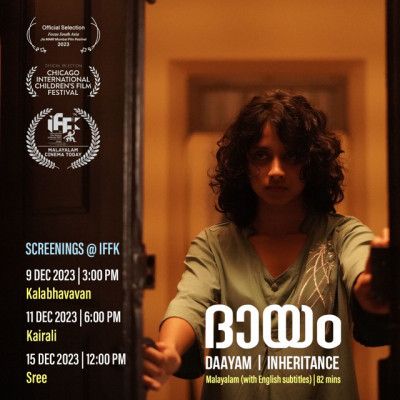Daayam’s Mirror to the Gender Paradox in Kerala
Prasanth Vijay’s movie Daayam (“Inheritance”), being screened at the ongoing 23rd International Film Festival of Kerala, is about a teenaged girl learning to cope with the loss of her mother. Her home, a typical upper middle-class nuclear family, is where most of the story unfolds. Even while exploring this primary socio-economic milieu, the film also brings up some keen observations about the larger Malayali society.

Prasanth says that the film was planned during the pandemic and naturally it was to be shot in the confines of a domestic space. He roped in filmmaker Indulakshmi–they both used to work for Infosys–to write the script and finish the shoot in a month. But the making got delayed and was finally finished when he was already busy with his third film. Selected in National Film Development Corporation’s Film Bazaar Recommends 2022, Daayam had its World premiere at MAMI Mumbai Film Festival 2023. It has also been selected for the Chicago International Children’s Film Festival.

The immediate locus of the film is the famous Malayalam short story “Neypaayasam”, written by the renowned writer Madhavikkutty a.k.a. Kamala Das. Roughly translated into Indian English Neypaayasam means “Ghee Kheer”. The story is a heart-wrenching account of the sudden death of a woman and the sweet dish she leaves behind. The dish is relished by her unsuspecting young children after her death even as the devastated father looks on in misery. Neypaayasam has remained a powerful motif for the Malayali literary public, for many years. But Daayam is just not a linear cinematic depiction of Neypaayasam. There is yet another famous Malayalam story that is closer to Daayam’s inner trajectory: Ashitha’s Amma Ennodu Paranja Nunakal (“The Lies Mother Told Me”).
The film has a Neypaayasam moment when Kalyani suddenly loses her mother Renuka to cerebral haemorrhage, and her recipe book is discovered from a kitchen shelf. The relatives wax eloquent about Renuka’s Neypaayasam, but its recipe is missing from the book. The movie has a deliberately slow pace, set to soulful music by Varkey, letting the shocking fact of the death sink in both for the individuals on screen and the audience watching them. But Daayam is not only about grief after profound loss, but a fly-on-the wall narrative of its aftermath, with elements of intrigue and drama.
Following the death of the woman and the exit of the extended family after the customary few days of ritualistic mourning, the house falls into disarray. Unwashed laundry and kitchen disasters rule the day but Kalyani and her father find their rhythm in time (stellar performances by Aathira Rajeev and Pradeep Geedha). Yet, things go horribly wrong and Kalyani is ultimately forced to become the adult of the family almost overnight.
Prasanth’s 2017 debut movie, Athisayangalude Venal (“Summer of Miracles”), was also about losing a parent. The protagonist, a young boy, struggles to cope with his father’s disappearance and Prasanth agrees that Daayam is a “spiritual sequel to my first work.” One might add that Kalyani too faces the disappearance of her father, all but physically.

From an understated tale of aching, the film gradually grows into a not-so-subtle study of patriarchy. Indeed some of the plot-points feel contrived and the climax is bordering on the regressive and yet Daayam is a painfully accurate narrative of a Kerala entrenched in superstitions, casteism, and elitism. Daayam once again highlights how the society has conveniently built up a veneer of progressiveness ably concealing the rot inside.
Daayam, in effect, is a provocative portrayal of the gender paradox of Kerala. Though the state consistently tops social indices, its homes reek of men’s entitlement. In a recent national sample survey, Kerala ranked at the bottom among the larger states in South India in terms of the proportion of women in the overall workforce. This, despite having a larger share of enrolment in higher education than men.
Marriage and domestic responsibilities are still considered the ultimate virtue for women across classes which cost them their dreams and career plans, a fact backed by the Kerala Knowledge Economy Mission survey. Daayam holds a mirror to this reality when Renuka, a teacher, dies and nobody talks about her profession but only about her cooking.

“Having a female writer has helped the film in gaining perspectives that I would not have been able to explore otherwise,” Prasanth says. The unglamorous and unflattering aspects of homemaking are indeed shown with precision. In a house reverberating with Malayalam poetry from across ages and happy-family vibes, there are hints of a woman, Renuka, leading the life of a volcano, with sporadic releases of fire and ash, fated to eventually explode and die.
In the meantime, she treads the age-old paths from the “children’s room to the husband’s bedroom to the kitchen”, as recounted by Ashitha in her short story, which ends with the daughter realizing that her mother was lying all along about the simple recipe for marital bliss. But by then, she had already learned the language of silence, like the umpteen women before her. In a striking continuity, Kalyani is seen silently inheriting (hence Daayam) her mother’s kitchen and her recipe book, oddly evoking memories of the 2021 film Great Indian Kitchen that had the lead woman storm out of the kitchen, showing domestic drudgery for what it is.
But unlike such movies, Prasanth says his films are not looking to serve justice or provide closure to its protagonists. “Much has been left unsaid, expecting the viewers to fill in even as they walk out of the cinema and long after,” he adds.

Curiously enough, the filmmaker feels that the viewers outside Kerala did not read too much into the climax: “They were able to relate to Kalyani’s affinity to her mother’s kitchen, a safe space of happy memories. But many Malayali viewers living in Kerala complained about the ‘meek’ ending. What I have to tell them is, Kalyani is only holding onto whatever she can; it’s a teenager’s attempt to make sense of her world that got suddenly upended. The rest is for the viewer to interpret.”
Therefore, one hopes Kalyani gets the recipe right as she attempts to cook her mother’s Neypaayasam using a non-existent recipe. And also the power to break an inheritance of silence that could very well have killed her mother.
A different version of this review article was published in The Wire too. Here’s the link to that story.
To receive updates on detailed analysis and in-depth interviews from The AIDEM, join our WhatsApp group. Click Here. To subscribe to us on YouTube, Click Here.







